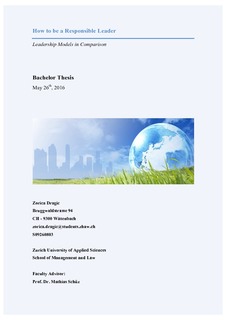Bitte benutzen Sie diese Kennung, um auf die Ressource zu verweisen:
https://doi.org/10.21256/zhaw-1258| Publikationstyp: | Thesis: Bachelor |
| Titel: | How to be a Responsible Leader : Leadership Models in Comparison |
| Autor/-in: | Dragic, Zorica |
| Betreuer/-in / Gutachter/-in: | Schüz, Mathias |
| DOI: | 10.21256/zhaw-1258 |
| Umfang: | 75 |
| Erscheinungsdatum: | 2016 |
| Verlag / Hrsg. Institution: | ZHAW Zürcher Hochschule für Angewandte Wissenschaften |
| Sprache: | Englisch |
| Fachgebiet (DDC): | 658.4: Leitendes Management |
| Zusammenfassung: | The modern business environment requires much more from leaders than just generating profits. Rather, they ought to be responsible. This means that they shall find a way to link performance with corporate social responsibility. A stakeholder perspective instead of a plain economic orientation is the first step toward this goal. The best example of a stakeholder-oriented leader is the integrator, who truly cares for the needs of others. Although this type of leader keeps an eye on profits, he or she is in fact more interested in creating value for various stakeholders. Which competencies a leader needs to perform responsible leadership can be assessed with the help of the personality theory. This states that human personality is arranged according to several levels. These are built upon each other, ranging from physiology to competencies. Concerning the physiological level, neuroscientific research indicates that effective leadership is strongly connected to the functioning of the right brain hemisphere. Among other impacts, it is responsible for the capability of balancing concerns of multiple stakeholders. There are four more levels between the physiological and the competency level. These are: motives, values, skills, and specific behaviors. The goal of this thesis, which is to assess the essential competencies for responsible leadership, has resulted in the formation of a holistic model. According to this, the vital competencies for acting as a responsible leader are: • Cognitive Intelligence • Emotional Intelligence • Social Intelligence • Ethical Intelligence • Spiritual Intelligence It is advisable to make an effort to develop these to their full potential. |
| URI: | https://digitalcollection.zhaw.ch/handle/11475/1260 |
| Lizenz (gemäss Verlagsvertrag): | CC BY 4.0: Namensnennung 4.0 International |
| Departement: | School of Management and Law |
| Enthalten in den Sammlungen: | BSc International Management |
Dateien zu dieser Ressource:
| Datei | Beschreibung | Größe | Format | |
|---|---|---|---|---|
| Dragic_Zorica_W.BA.IM.pdf | 3.12 MB | Adobe PDF |  Öffnen/Anzeigen |
Zur Langanzeige
Dragic, Z. (2016). How to be a Responsible Leader : Leadership Models in Comparison [Bachelor’s thesis, ZHAW Zürcher Hochschule für Angewandte Wissenschaften]. https://doi.org/10.21256/zhaw-1258
Dragic, Z. (2016) How to be a Responsible Leader : Leadership Models in Comparison. Bachelor’s thesis. ZHAW Zürcher Hochschule für Angewandte Wissenschaften. Available at: https://doi.org/10.21256/zhaw-1258.
Z. Dragic, “How to be a Responsible Leader : Leadership Models in Comparison,” Bachelor’s thesis, ZHAW Zürcher Hochschule für Angewandte Wissenschaften, 2016. doi: 10.21256/zhaw-1258.
DRAGIC, Zorica, 2016. How to be a Responsible Leader : Leadership Models in Comparison. Bachelor’s thesis. ZHAW Zürcher Hochschule für Angewandte Wissenschaften
Dragic, Zorica. 2016. “How to Be a Responsible Leader : Leadership Models in Comparison.” Bachelor’s thesis, ZHAW Zürcher Hochschule für Angewandte Wissenschaften. https://doi.org/10.21256/zhaw-1258.
Dragic, Zorica. How to Be a Responsible Leader : Leadership Models in Comparison. ZHAW Zürcher Hochschule für Angewandte Wissenschaften, 2016, https://doi.org/10.21256/zhaw-1258.
Alle Ressourcen in diesem Repository sind urheberrechtlich geschützt, soweit nicht anderweitig angezeigt.